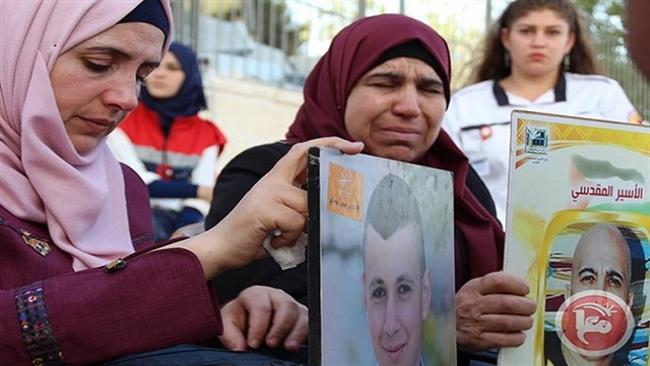
RNA - The protesters converged in front of the International Committee of the Red Cross (ICRC) building in the Sheikh Jarrah neighborhood of the city on Wednesday, calling on international and legal organizations to intervene “without any delay and address the demands of Palestinian prisoners.”
Head of the Palestinian Prisoners’ Society (PPS), Nasser Qaws, said at the sit-in that the Israel Prison Service (IPS) was “trying to spread rumors to break the will of prisoners and their families.”
He was referring to a video that purportedly shows Marwan Barghouti, former jailed Fatah leader who is leading the hunger strike, eating a cookie and a wafer in his prison cell toilet
Qaws added that some prisoners had even stopped consuming water, which led them “to go through a very difficult and critical stage.”
“Our prisoners will not give up as they have sacrificed their freedom for our country,” Fatah official Hatem Abd al-Qadir said.
He also urged the Ramallah-based Palestinian Authority to place the issue of hunger-striking prisoners “high on its agenda.”
On May 8, the new chief of Hamas’s political bureau said the Islamic resistance movement stands with Palestinian hunger strikers.
Ismail Haniyeh stated that the prisoners’ “cause has been and will remain a top priority for Hamas and Palestinian leadership under any circumstances.”
"Your freedom is a national duty and your dignity is our dignity,” he added.
Since April 17, more than 1,600 Palestinian prisoners have joined the protest action, dubbed the Freedom and Dignity Strike.
The strikers are demanding basic rights, such as an end to the policies of administrative detention, solitary confinement and deliberate medical negligence.
The much criticized administrative detention is a policy under which Palestinian inmates are kept in Israeli detention facilities without trial or charge.
Back in 2012, a similar hunger strike, involving some 2,000 Palestinian inmates, ended after an agreement was reached with Israeli authorities to terminate the policy of internment without trial or charge.
The Palestinian inmates regularly hold hunger strikes in protest against the administrative detention policy and their harsh prison conditions.
Nearly 700 prisoners are currently held in administrative detention. Some of the inmates have been held in prison under the policy for up to 11 years.
847/940